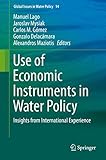Use of economic instruments in water policy insights from international experience [edited by] Manuel Lago
Colaborador(es): Lago, Manuel [ed. lit.] | Mysiak, Jaroslav [ed. lit.]
| Mysiak, Jaroslav [ed. lit.] | Gómez, Carlos M [ed. lit.]
| Gómez, Carlos M [ed. lit.] | Delacámara, Gonzalo [ed. lit.]
| Delacámara, Gonzalo [ed. lit.] | Maziotis, Alexandros [ed. lit.]
| Maziotis, Alexandros [ed. lit.] .
.
Tipo de material:  LibroSeries Global issues in water policy 14.Editor: Cham ; etc. Springer 2015Descripción: xiv, 423 p. gráf. 24 cm.Tipo de contenido: Texto (visual) Tipo de medio: sin mediación ISBN: 9783319182865; 9783319182872.ISSN: 2211-0631; 2211-0658.Tema(s): Agua
LibroSeries Global issues in water policy 14.Editor: Cham ; etc. Springer 2015Descripción: xiv, 423 p. gráf. 24 cm.Tipo de contenido: Texto (visual) Tipo de medio: sin mediación ISBN: 9783319182865; 9783319182872.ISSN: 2211-0631; 2211-0658.Tema(s): Agua| Tipo de ítem | Ubicación actual | Signatura | Estado | Fecha de vencimiento | Código de barras |
|---|---|---|---|---|---|
 Libro
Libro
|
Biblioteca y Centro de Documentación CNMC - Biblioteca de Competencia
Biblioteca especializada en Derecho de la Competencia, Derecho Mercantil y Economía Dirección C/ Barquillo, nº 5, 28004 Madrid
|
C.1294 (Navegar estantería) | Prestado | 03/13/2018 | 6526 |
Navegando Biblioteca y Centro de Documentación CNMC - Biblioteca de Competencia Estantes Cerrar el navegador de estanterías
Incluye referencias bibliográficas e índice
This book assesses both the effectiveness and efficiency of implemented Economic Policy Instruments (EPIs) in order to achieve water policy goals and identifies the preconditions under which they outperform alternative (e.g. regulatory) policy instruments and/or can complement them as part of complex policy mixes. The development of a consolidated assessment framework helps clarify (and where possible, quantify) the effectiveness of each EPI on the basis of different criteria.
Outcome-oriented criteria describe how the EPIs perform. They include intended and unintended economic and environmental outcomes and the distribution of benefits and costs among the affected parties. These steps consider the application of cost effectiveness and cost benefits analysis, e.g. to assess ex-post performance of the EPI. Process criteria describe the institutional conditions (legislative, political, cultural, etc.) affecting the formation and operation of the EPI studied (particularly relevant for assessing the possible impacts of using economic instruments), the transaction costs involved in implementing and enforcing the instruments and the process of implementation.
Case studies from Cyprus, Denmark, France, Germany, Hungary, Italy, the Netherlands, Spain and the United Kingdom, as well as from Australia, Chile, Israel and the USA are presented in this book. A wide variety of EPIs are also covered, including water-pricing schemes (tariffs, environmental taxes, environmental charges or fees, subsidies on products and practices), trading schemes (tradable permits for abstraction and pollution) and cooperation mechanisms.







No hay comentarios para este ejemplar.